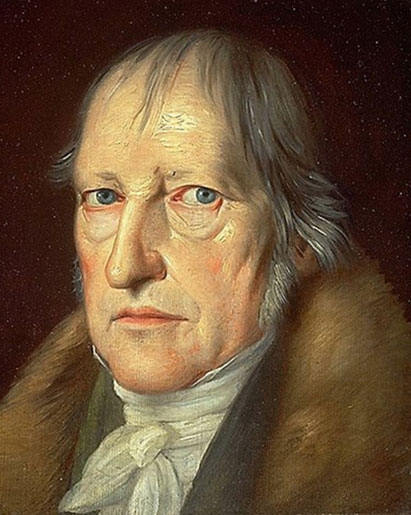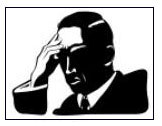Georg Wilhelm Friedrich
Hegel (1770-1831)

“The principles of the successive phases of Spirit… are
themselves only steps in the development of one universal Spirit… Nothing in the past is lost for it, for the Idea
is ever present; Spirit is immortal; with it there is no past, no future, but an essential now" ―
G.W.F Hegel
“Reason could and should develop the
tongues of angels.” ― G.W.F.Hegel
“America is therefore the land of the
future, where, in the ages that lie before us, the burden of the World's History shall reveal
itself.” ― Hegel
The German philosopher G.W.F. Hegel, in
addition to having made significate contributions to aesthetics, ontology and
politics, is considered to be one of the prominent figures in German
Idealism.
Hegel’s key work, ‘The Phenomenology of Spirit’
(1807), originally titled 'Science of the Experience of Consciousness', marked a major development in German
Idealism after Kant. Hegel developed his concepts of the dialectic, Absolute
idealism, ethical life and the Aufheben or 'sublation' – attempting to integrate,
without elimination or reduction, opposing factors such as between necessity & freedom or transcendence &
immanence. Hegel’s philosophy of spirit conceptually integrates psychology, the state,
history, art, religion and philosophy where the dualisms of Mind &
Nature and Subject & Object are overcome.
Philosophy professor Terry Pinkard (Georgetown
Univ.) comments in “Hegel's Phenomenology-The Sociality of Reason" (1994): "Phenomenology of Spirit is one of
Hegel's most read, best known and least understood works. It has an air of mystery about it: at once profound and
yet obscure, detailed, important but only available to the initiated...Even the tales of its creation have a bit of
romance [and the danger of the ‘end of history’] in them: [of Hegel] writing the final parts in the city Jena which
is being shelled by Napoleon's troops...Hegel's thought has been praised and blamed for the development of
existentialism,
communism, fascism, death of
God theology and historical nihilism. Hegel has also been called the Aristotle of the
modern world and the Aquinas of
Protestantism.”
The quintessential philosophical pessimist,
German philosopher Arthur Schopenhauer ('The World as Will and Representation', 1918), rejected the ideas of German
Idealism and attributes Hegel’s writings as ‘vacuous verbiage’: "I do not think that it is difficult to see that
whoever puts forward anything like this is a shameless charlatan who wants to fool simpletons and observes that he
has found his people in the Germans of the nineteenth century."
Mode of
Thought

In the beginning of a lecture on Hegelism the late philosophy professor Daniel
Robinson comments: “Sometimes students ask for a quite sharp distinction between the Classical and the
Romantic perspective – students very often want one-line answer to questions that really call
for volumes. Over the years I have so often struggled to make the distinction and, out of fatigue and
frustration, I hit on this one: Aristotle’s will call for him to be buried next to his wife and Hegel’s
will calls for him to be buried next to Fichte.”
Hegel is part of the ‘Romantic’ tradition that
finds in science not only a mechanistic perspective (‘mechanistic science’) but an enterprise that produces
formal laws that
explains nothing. Hegel sees science, after the age of Newton, as a narrow, one-sided misleading affair that
actually doesn’t explain anything – it only describes. In Hegel’s ‘mode of thought’ is that we should be
looking for the reason behind the laws.
Professor of philosophy Arthur Holmes (Wheaton
College) compares Hegel’s ‘mode of thought’ with Kant: “Kant’s thinking is known as linear thinking: tracing out a
line of argument; trying to identify the underlying presuppositions or the transcendental presuppositions - the
hidden concepts. That's not Hegel. Hegel is like diving into a pool and trying to find your bearing. Looking for
points of reference. Different kind of reading experience…Kant is engaged in deductive thinking, tracing the
logical connection between propositions - logical propositions. Hegel is not dealing with propositions. He's
dealing with concepts. He's analyzing concepts. Unpacking concepts. A different mode of
thinking.”
Hegel’s ‘mode of thought’ is creative vitality,
the sovereignty of the creative spirit - a romantic perspective, not a mechanistic point of view. Hegel’s
philosophy is in the realm of metaphysical monism - an absolute idealism where everything is Spirit at
work.
The Dialectic
Process
The problem of truth is that there are several competing truths which claim to be the
'absolute'
truth. How to discern truth from opinion? Hegel use a logical structure known as
the Dialectic Process to find ‘absolute’ truth. It is a three-step process where ‘truth’ emerges from a
struggle that moves toward a synthesis:
1) thesis – initial idea or proposition.
2) antithesis – the refutation of thesis, typically taking the opposite
side.
3) synthesis – molding of the thesis and antithesis into a new idea or thesis –
the ‘Aufheben’.
Philosophical digression: In actual truth,
Hegel never used the terms thesis, antithesis, and synthesis, they were coined by Johann Fichte, however Hegel did
use the structure.
So Hegel’s Dialectic Process is a struggle of
opposing ideas (‘Sturm und Drang’) where the forces of nature can be dark, dangerous and mysterious. Sort of a
Gothic operation - outcomes are not always predictable, especially from a mechanistic view. Professor Robinson
concludes: “What Hegel is giving us is the recognition that with the sublime comes a dialectic of terror and
conflict; that progress is won at a price; that history is organic, nothing stays in place, and reality is always
more that we see.”
Dialectical Triad: Art, Religion &
Philosophy
Hegel’s quest to find absolute truth was to synthesize the outcome of three domains
in which a universal is dialectically produced:
1) Art – the individual work
of the artistic genius instantiates the universal ‘Beauty’. Truths in the
aesthetic domain are ultimate truths.
2) Religion – the
individual goodwill of the genius of Christ instantiates the universal ‘Goodness’. Truths of
the universal Christ or the Christ
Conscienceness are ultimate truths.
3) Philosophy – Spirit
intuits Universal
Truths. The logical ultimate synthesis or ‘absolute truth’ recognizes that Beauty, Truth &
Goodness are not islands unto themselves. Beauty cannot be fully understood without
Truth and Goodness, likewise for Truth (must incorporate Beauty & Goodness) and for Goodness (must
incorporate Truth & Beauty).
Heirs of
Hegel
Marxism. Both Karl Marx and Fredrick Engels accepted Hegel’s dialectical process without
reservation. What they did reject was Hegel’s (spiritual) ideas as opposed to the modes of production and the
material conditions of life that determine ideas, beliefs and thoughts. Marx took Hegel’s ideas with a slant toward
society as a whole and created the philosophical basis for socialism and communism. Marx literally took the mental
struggle of the dialectical ‘idea’ process to be a physically violent, hence Marx's commitment to revolution. Marx
ended up being wrong about change and how change takes place (not all his fault - in his day it was the early and
not fully understood Industrial Revolution and Capitalism, “ver 1.0”). He predicted that capitalism would
drive down wages to survival level before its final denouncement. In truth as economies became more advanced, both
wages and living standards rose to levels not even dreamt of in Marx's day, In the grand collective experiment, it
took over seventy years from Marx’s antithesis ‘Dictatorship of the Proletariat’, beginning with the October
Revolution of 1917, to invalidate his ‘Classless Society’ synthesis marked by the fall of the Berlin Wall
(1989).
Marx critics raised the point that Marx did not deal with the question of the abuse of power in his socialistic
utopia (possibly due to the philosophical optimism he inherited from Hegel). Marx ‘absolute truth’ was that
no matter how powerful or advanced an individual might be, at the end of the day their ability to create change
would be overshadowed by the larger cultural, social and economic forces at play. The irony is that governmental
social policies that attempt to maintain economic equality, not without good intensions, often does more harm than
good. Lord Acton was proved true in light of the Stalinist period in the Soviet Union – “Power corrupts, and
absolute power corrupts absolutely”.
In the end Marx’s position on Hegel could be said to be a refutation of the metaphysical principle of the Law of
Attraction: Ask, Belief & Receive. The old perennial debate: ‘Mind over Matter’ versus ‘Matter over
Mind’.
* European phenomenology
and existentialism.
* John Whitehead – process philosophy, process theology.
* John Dewey -
American pragmatism
* Ralph Waldo Emerson. Emerson can be seen as taking Hegel’s
ideas with a slant toward the individual and creating the philosophical basis for the American version of a
free-market capitalism and democracy. Emerson saw the individual as the fundamental driver of change. Create a
society that generates a steady stream of strong individuals and the great among them will create the pathways that
the rest of culture will follow. Emerson believed that when individuals became so advanced that they could allow
the Over-soul to take command of their will then they became vehicles for social transformation. Such
“representative men” become the leaders that the rest of culture follows. From Hegel’s influence on Emerson one can
trace out the influences of Emerson: American Transcendentalism (1830-1840s); New Thought
Movement; William James (‘Varieties of Religious Experience’, 1902; Emerson has been noted as
James ‘intellectual god-father’); Samuel T. Coleridge (‘Aids to Reflection’, 1904), Thomas Troward (Edinburgh Lectures on
Mental Science, 1904).
In closing on Hegel Dr. Robinson concludes,
“Hegel’s logic is an interesting and often misunderstood logic. Hegel’s admiring English translators later
described his style as Himalayan severity. Whole departments have been organized around an attempt to get
Hegel right. Tenure is won or lost depending on how you deal with Hegel. There are entire traditions in
philosophy that are Hegelian from dawn till dusk. And I have yet to meet two Hegelians who agree completely
on any central aspect of Hegel’s teaching – agree completely on it. If some respects, you’re led to believe,
unless you’re a member of a Hegelian cloth, you’re never going to get it right anyway.”
| 
